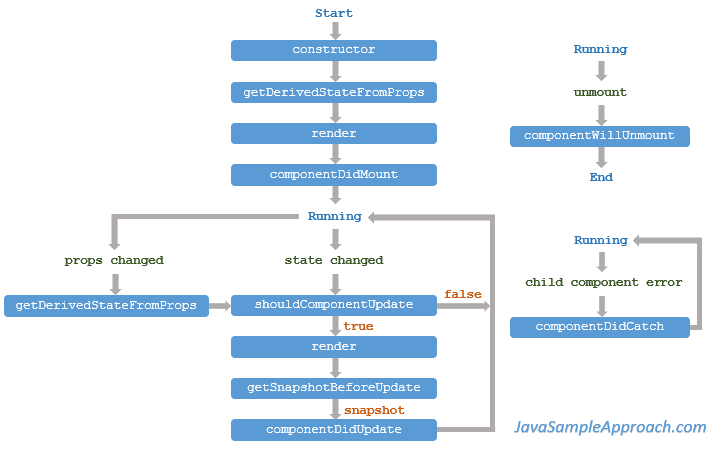React Component Lifecycle Methods from v16.3 with example
From v16.3, React introduces new 2 lifecycles getDerivedStateFromProps, getSnapshotBeforeUpdate, and also notices that 3 methods will be in time considered deprecation componentWillMount, componentWillUpdate, componentWillReceiveProps. In this tutorial, we're gonna look at new React Component Lifecycle Methods, then we will build an example that uses them.
Component Lifecycle
Mounting methods
constructor()
This method will be called whenever a new object is created. super(props) calls the constructor of parent class (React.Component) to initialize itself. Now we have access to this.props.
constructor() is used for setting up Component such as creating class fields or initialize state by directly overwriting the this.state. Don’t call this.setState() here.
It is also often used to bind functions that will be passed as callbacks.
constructor(props) {
super(props);
this.add = this.add.bind(this);
this.minus = this.minus.bind(this);
this.state = {
counter: 0,
anotherCounter: props.initialCounter
}
}Don't make any side effects (AJAX call for example) or subscription in the constructor. Use componentDidMount() instead.
static getDerivedStateFromProps()
This method is invoked after a Component is instantiated as well as when it receives new props.
Static method doesn't exist on instance, but the class. So it does not have access to this keyword. It helps us NOT call this.setState() here, instead we should return an object to update state, or null if no update is needed (only need to return the part of state that changes, other will be preserved).
*Note:
If parent Component causes this Component to re-render, this method will be called even if
propshave not changed => compare new and previous values if we want to handle changes.-
Calling
this.setState()doesn’t triggergetDerivedStateFromProps().static getDerivedStateFromProps(nextProps, prevState) { if (prevState.counter > nextProps.maxCount) { console.log('set counter to [' + nextProps.maxCount + ']'); return { counter: nextProps.maxCount }; } console.log('check MAX counter >> no need to change counter!'); return null; }render()
This method is required.
When render() is called, it analyses this.props and this.state and return React elements (native DOM Component or a user-defined composite Component), String or number, Portal, null or Boolean (render nothing).
render() should not modify component state or directly interact with the browser. If you need to interact with the browser, use componentDidMount() or the other lifecycle methods instead.
*Note:: render() will not be invoked if shouldComponentUpdate() returns false.
render() {
return (
<div>
<h1>Java Sample Approach</h1>
<h3>{this.props.maxCount}</h3>
<p>Counter: {this.state.counter}</p>
<button onClick={this.add}>ADD+</button>
<CalculatorComponent />
</div>
);
}React Component Lifecycle Methods from v16.3 with example







Top comments (0)